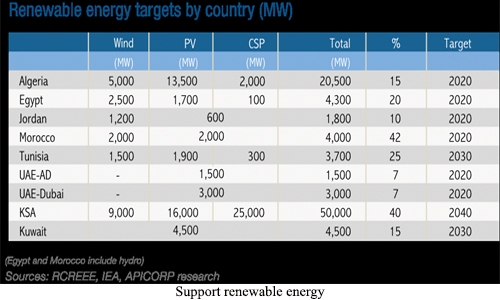Support renewable energy
Renewable energy scene in Bahrain and other countries are not receiving enough support for growth, according to a research report by Arab Petroleum Investments Corporation (APICORP).
The region which witnessed some of the lowest renewable-energy prices awarded globally for solar and wind, along with most ideal conditions has great potential in renewable energy scene, but only if governments rise to the challenge and improve the regulatory and investment environment to attract investment required for the sector’s growth, the report says.
Quoting International Energy Agency data, the report said that global average onshore wind costs decreased by 30 per cent while those for solar dropped by 70pc between 2010 and 2015, mostly due to technological advancements. The costs are expected to drop down further with more investments and creation of increased capacity.
Financing renewable energy projects will be more challenging in the current environment and hence more efforts to improve regulatory framework is needed to attract investment.
Reliance on fuel imports to meet domestic demand and a rising import bill have pushed Morocco and Jordan to diversify their energy sources. But Large oil or gas reserves and cheap extraction costs mean that hydrocarbons continue to meet rising demand in countries like Saudi Arabia, Kuwait, and Qatar. Policy uncertainty and the lack of an efficient regulatory framework are mainly responsible for slow progress, according to the report.
APICORP further added “In 2012, the King Abdullah City for Atomic and Renewable Energy announced plans to invest $109 billion to produce 41GW of solar by 2032 in the kingdom. But little progress has been made so far. Given the large amount of investment required to reach this ambitious target, it is highly unlikely that the government will meet its renewable targets for now. Other countries, such as Kuwait, have declared a 15pc renewable-energy target by 2020 but have only selected preferred bidders for its 50MW Al-Shagaya CSP plant; while Qatar, Oman, and Bahrain have made minor investments with no significant additions expected soon.”
“Despite many claims that renewable energy will never reach its Potential, unless subsidies are phased out, fuel subsidies are not the main constraint for renewable development and other factors play a more important role. One problem lies in the electricity-market structure in Arab countries. Almost all rely on a state-owned wholesale buyer to buy and sell electricity.
“Government wholesale buyers decide the purchase price of electricity from generators as well as the selling price to consumers. If governments want to keep prices low for end-consumers, there is nothing to prevent them from incentivising renewable-energy sources in the same way they subsidise conventional sources.
“If governments want to keep prices low for end-consumers, there is nothing to prevent them from incentivising renewable-energy sources in the same way they subsidise conventional sources.”
Related Posts

